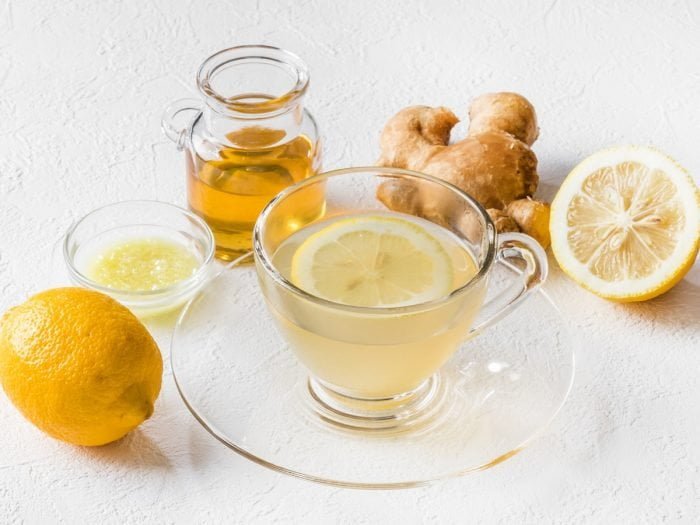Proven Health Benefits of Lemon Ginger Tea – Lemon ginger tea might be for you if you’re looking for a warm, comforting beverage with health benefits and a strong flavor. It is a favorite among people who drink herbal tea. In fact, lemon ginger tea has been consumed for hundreds, if not thousands, of years. A relaxing bedtime routine that can help you put the day behind you is drinking a herbal tonic like lemon-ginger tea.
Tea made with fresh lemon and ginger is exactly what it sounds like; you can add some honey or agave nectar, if you’d like, to make it a little sweeter. You might be curious as to whether lemon-ginger tea offers any special health advantages. While it might not put you to sleep, it might help you unwind, relax, and offer other advantages.
Cardamom, turmeric, and ginger are all members of the same plant family. It originated in China and India, where people used it as a tonic because they thought it had healing properties. Ginger arrived in Europe via the spice trade during the Medieval times, where it was even used in candies.
Since then, ginger has been used as a seasoning in many different forms, including fresh, dried, pickled, crystallized, powdered, or ground. Lemons are well known for their acrid, sour flavor as well as for being a superior source of vitamin C and antioxidants. Lemons have been a common ingredient in many teas, both as a flavoring and as an additive.
People Also Read: Ballerina Tea Benefits and Side Effects
What are the Health Benefits of Lemon Ginger Tea?
1. May Alleviate Nausea
Ginger has long been praised for its ability to reduce nausea, which many people encounter in a variety of situations, including those related to chemotherapy and pregnancy. One to 1.5 grams of ginger per day may be sufficient to have an anti-nausea effect, according to research. In half of the studies analyzed, ginger was found to prevent and reduce chemotherapy-related nausea and vomiting.
The precise mechanisms by which ginger reduces nausea is still unknown to science, but gingerol is one of the main plant compounds thought to be responsible. Results, though, have been contradictory. In a separate analysis of seven studies, three found that ginger reduced nausea, two showed mostly positive effects, and two others found no effect of ginger on chemotherapy-related nausea and vomiting.
2. Soothes Indigestion
A cup of lemon-ginger tea before bed may be a great tonic if persistent indigestion or a heavy dinner keeps you up later than you would like. Ginger (Zingiber officinale) is a root that has been used for many years in alternative and folk medicine to treat delayed stomach emptying.
In addition, lemon (Citrus limon) contains limonene, a plant compound that facilitates digestion by moving food along the digestive tract, potentially reducing the unpleasant sensation of fullness. You might discover that the combination of lemon, ginger, and water in lemon-ginger tea soothes indigestion, even though the amount of limonene in each cup varies.
3. May Reduce Nasal Congestion
Your hot lemon-ginger infusion may help to open up your nasal cavities, which will aid in clearing a stuffy nose. Warm liquids can also ease sore throats brought on by mucus buildup. Although most of these effects are anecdotal and backed by folk medicine, they may be helpful to keep in mind if you suffer from seasonal allergies or during cold and flu season. None of these conditions will be cured by lemon-ginger tea, but it might help relieve congestion and make it easier for air to pass through your nose.
4. May Relieve Constipation
Dehydration and a diet lacking in fiber are two things that can cause constipation. When dehydration is the cause of constipation, unwinding with a warm cup of lemon-ginger tea in the evening may be beneficial because water facilitates stool passage through the digestive tract.
Make sure you’re drinking enough fluids throughout the day if you experience chronic constipation. If you experience bowel problems or have them less frequently than three times per week, it is advisable to consult a healthcare provider.
5. Keeps you Hydrated
You are, of course, drinking water when you consume lemon-ginger tea, along with fragrant ginger and lemon essence, so your body is being hydrated. This is crucial because it keeps your kidneys, gut, and heart—among other important organs—in good working order. Your daily water requirements depend on a variety of factors, including your activities, medications, and health conditions.
6. May Help Fight Inflammation
One of the plant substances found in ginger, gingerol, is anti-inflammatory and antioxidant. Heart disease, cancer, metabolic syndrome, and Alzheimer’s disease are all associated with chronic inflammation. Studies, however, have produced mixed results regarding ginger’s ability to reduce inflammation in humans.
Additionally, it’s important to keep in mind that there is currently insufficient research to determine the precise dosage of gingerol required to produce these effects, as well as how much of it you would actually receive from consuming a typical cup of lemon-ginger tea.
People Also Read: How To Detox Your Body In 7 Days
7. Provides a Moment of Mindfulness
Comforting routines, like a nightly cup of lemon-ginger tea, can also provide you with a peaceful moment of reflection. Consider it a chance to engage in mindfulness. Practice of mindfulness can improve one’s health in addition to being useful for relaxation. According to a review study, practicing mindfulness may help you deal with difficult feelings and go about your day more deliberately.
Additionally, you diffuse the essential oils of lemon by letting the steam from a lemon peel in a cup of warm lemon-ginger tea pass under your nose. Though more research is required, the benefits of lemon oil vapor are possible. One study revealed that inhaling the vapor of lemon oil enhanced relaxation.




